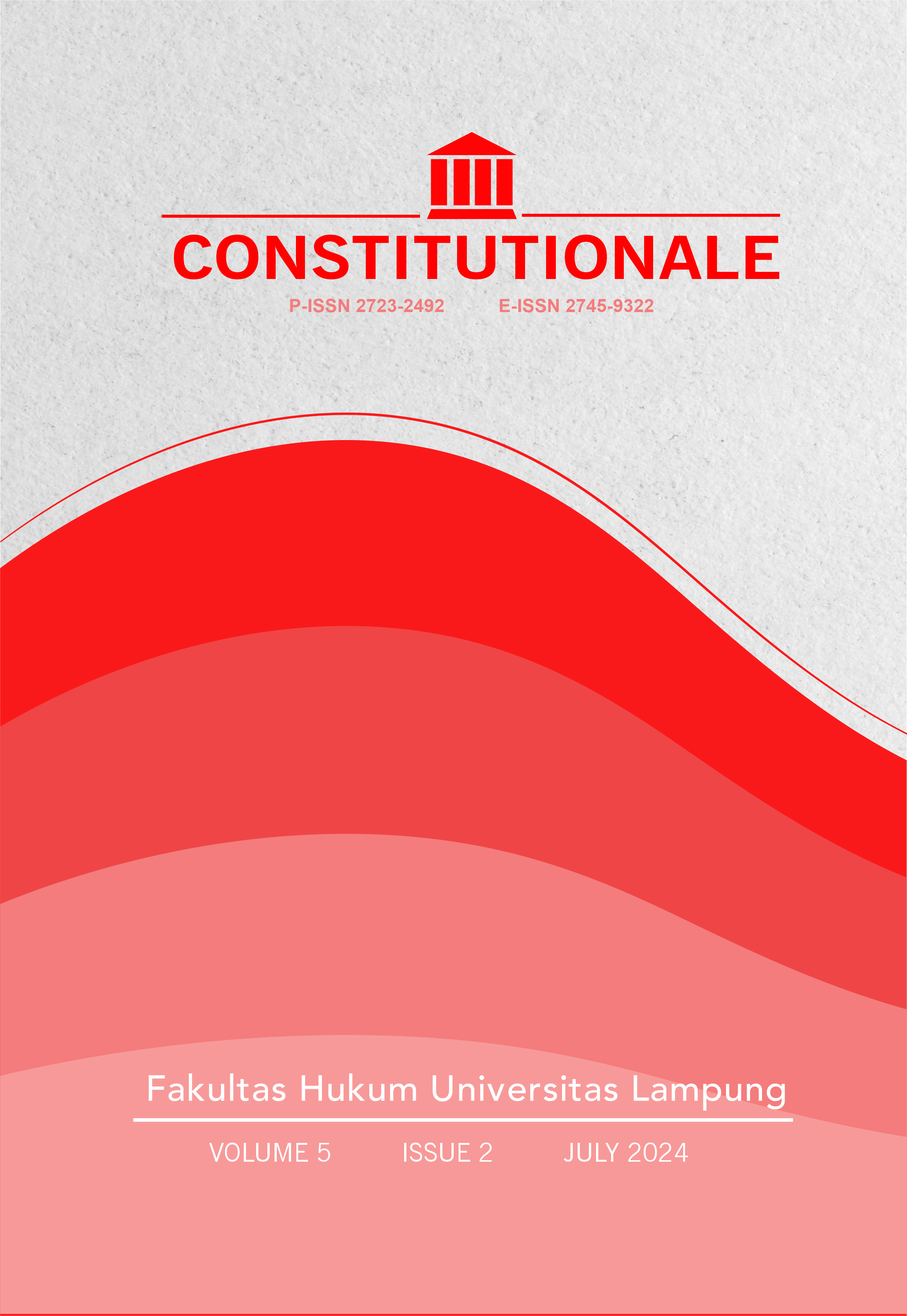Towards A Juristocratic State: A Critical Analysis Of The Constitutional Court Decision No 90/Puu-Xxi/2023 Concerning The Age Limits Of Vice Presidential Candidates
DOI:
https://doi.org/10.25041/constitutionale.v5i2.3515Abstract
The Constitutional Court Decision Number 90/PUU-XXI/2023 Concerning the Age Limit for Vice Presidential Candidates in the 2024 Presidential Election has caused much controversy, both politically and legally. This decision has profound implications for Indonesia’ political configuration, as it grants constitutional legitimacy to Gibran Rakabuming Raka, enabling him to run as a candidate for vice president of the Republic of Indonesia in the 2024 General Election. In the context of the legal debate, several problems have emerged, including the impact of this decision on the quality of democracy in Indonesia. One key concern is whether this decision is the initial gateway for Indonesia to enter a system called 'juristocracy'. This term refers to a situation where the Constitutional Court Decision justifies the practice of 'negative legislation', where the legislative function is constitutionally only given to the President and the DPR, but the Constitutional Court, through its 'final and binding' decision power, makes this a loophole that potentially damage democracy. This research is focused on examining the decision based on the two fundamental problems outlined above, using a library research method based on normative research, with a conceptual approach as its foundation. The analysis employs the theory of the rule of law to critically assess whether the decision has significant positive or negative implications for the sustainability of democracy and the existence of the rule of law in Indonesia in the future.
Keywords:
Juristocracy, Constitutional Court, Democracy, Constitutional Court Decision No. 90/PUU-XXI/2023, The Age Limit for Vice Presidential Candidates, The 2024 Presidential ElectionReferences
Asshiddiqie, J. (2021). Memperkenalkan Peradilan Etika. Jurnal Konstitusi Dan Demokrasi, 1(1), 1–7.
___________. (2006). Konstitusi dan Konstitusionalisme. Jakarta: Sekretariat Jenderal dan Kepaniteraan Mahkamah Konstitusi RI.
___________. & Safa'at, M. A. (2006). Teori Hans Kelsen Tentang Hukum. Mahkamah Konstitusi RI, Sekretariat Jenderal dan Kenpaniteraan.
Aziz Huq & Tom Ginsburg, How to Save a Constitutional Democracy (University of Chicago Press, 2018).
Barak, A. (2006). The Judge in a Democracy. Princeton University Press. http://www.jstor.org/stable/j.ctt7szb4
Hirschl, R. (2004). Towards Juristocracy: The Origins and Consequences of the New Constitutionalism. Harvard University Press. https://doi.org/10.2307/j.ctv15d81nb
Kelsen, Hans, GeneralTheory of Law and State.Cambridge: Harvard UnityPess, 1949.
Mahfud, M. D. Moh., 2010. Konstitusi dan Hukum dalam Kontroversi Isu. Jakarta, Rajawali Pers.
Martitah. (2013). Mahkamah Konstitusi Dari Negative Legislature ke Positive Legislature?, Jakarta: Penerbit Konstitusi Press.
Wau, A., Is, M. S., Lobo, F. N., Lay, B. P., Arista, W., Rizkia, N. D., ... & Indriani, S. (2023). Hukum Tata Negara. CV. Intelektual Manifes Media.
Ajie, R. (2016). Batasan pilihan kebijakan pembentuk undang-undang (Open legal policy) dalam pembentukan peraturan perundang-undangan berdasarkan tafsir Putusan Mahkamah Konstitusi. Jurnal Legislasi Indonesia, 13(2), 111-120.
Aspinall, E., Fossati, D., Muhtadi, B., & Warburton, E. (2020). Elites, masses, and democratic decline in Indonesia. Democratization, 27(4), 505-526.
Aziz Huq, "Democratic Erosion and the Courts: Comparative Perspectives," 93 NYU Law Review Online 21 (2018).
Davis, D. M. (2016). Separation of powers: juristocracy or democracy. South African Law Journal, 133(2), 258-270.
Disantara, F. P., Putri, F. F., Mufarrochah, S., & Assari, E. (2023). Ekstentifikasi Kewenangan Majelis Kehormatan Mahkamah Konstitusi Dalam Memperkuat Gagasan Constitutional Ethics. LITIGASI, 24(1), 40-63.
Faiz, Pan Mohammad, Relevansi Doktrin Negative Legislator, MajalahKonstitusi No. 108. Jakarta: Mahkamah Konstitusi, 2016.
Fossati, D., Muhtadi, B., & Warburton, E. (2022). Why democrats abandon democracy: Evidence from four survey experiments. Party Politics, 28(3), 554-566.
Goldstein, L. F. (2004). From democracy to juristocracy. Law & society review, 38(3), 611-629.
Grant, J. (2010). The Rise of Juristocracy. The Wilson Quarterly (1976-), 34(2), 16-22.
Hakim, M. R. (2018). Tafsir Independensi Kekuasaan Kehakiman Dalam Putusan Mahkamah Konstitusi/Interpretation Of Judicial Power Independence In Constitutional Court Decisions. Jurnal Hukum dan Peradilan, 7(2), 279-296.
Hirschl, R. (2004). " Juristocracy"--Political, not Juridical. The good society, 13(3), 6-11.
Kimura, E., & Anugrah, I. (2024). Indonesia in 2023: Between Democracy and Dynasty. Asian Survey, 64(2), 267-277.
Kristal, D. (2022). Perbandingan (De) Konsolidasi Demokrasi: Studi Penurunan Kualtias Demokrasi di Indonesia dan Filipina Pada Periode 2016-2020. Jurnal Penelitian Politik, 18(2), 122-140.
Lin, C. C. (2016). Autocracy, Democracy, and Juristocracy: The Wax and Wane of Judicial Power in the Four Asian Tigers. Geo. J. Int'l L., 48, 1063.
Muhtadi, B. (2019). Populisme, politik identitas, dan dinamika elektoral: mengurai jalan panjang demokrasi prosedural. Intrans Publishing.
Mujani, S., & Liddle, R. W. (2021). Indonesia: Jokowi sidelines democracy. J. Democracy, 32, 72.
Nackenoff, C. (2006). Is There a Political Tilt to Juristocracy. Md. L. Rev., 65, 139.
Pokol, B. (2021). Juristocracy: The beginnings. Jogelméleti Szemle, (3), 62-70.
Satriawan, I., & Lailam, T. (2019). Open Legal Policy dalam Putusan Mahkamah Konstitusi dan Pembentukan Undang-Undang. Jurnal Konstitusi, 16(3), 559-584.
Sigalet, G. (2021). Between Populism and Juristocracy: The Republicanism of Rainer Knopff. Canadian Journal of Political Science/Revue canadienne de science politique, 54(3), 513-533.
Undang-Undang Dasar Negara Republik Indonesia tahun 1945.
Undang-Undang Nomor 7 Tahun 2017 tentang Pemilihan Umum (Lembaran Negara Republik Indonesia Tahun 2017 Nomor 182, Tambahan Lembaran Negara Republik Indonesia Nomor 6109).
Putusan Mahkamah Konstitusi Nomor 90/PUU-XXI/2023 tentang Batas Usia Capres dan Cawapres.
https://www.mkri.id/index.php?page=web.Berita&id=19751&menu=2.
Downloads
Downloads
Published
How to Cite
Issue
Section
Copyright
Copyright (c) 2025 by the Auhtor(s) Published by Development Centre Research of Law and Scientific Publication on behalf of the Faculty of Law, Universitas Lampung
License

This work is licensed under a Creative Commons Attribution-ShareAlike 4.0 International License.









